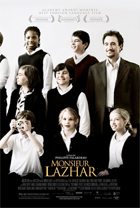Monsieur Lazhar
|  Philippe Falardeau’s Monsieur Lazhar is set almost entirely in and around a primary school in Montréal that has been the scene of a terrible tragedy that has robbed a class of their beloved teacher and left administrators grasping for a means of dealing with the fallout. In steps Bachir Lazhar (Mohamed Fellag), a soft-spoken Algerian émigré who takes over the class no one else wants for reasons that seem entirely altruistic. And, in a sense, they are, although as the film moves forward, we learn that Lazhar has his own tragic past, one that makes him both uniquely suited to help the eight-year-olds in his charge and truly dangerous to the status-quo means of coping with tragedy, which is to say, “moving on.” Philippe Falardeau’s Monsieur Lazhar is set almost entirely in and around a primary school in Montréal that has been the scene of a terrible tragedy that has robbed a class of their beloved teacher and left administrators grasping for a means of dealing with the fallout. In steps Bachir Lazhar (Mohamed Fellag), a soft-spoken Algerian émigré who takes over the class no one else wants for reasons that seem entirely altruistic. And, in a sense, they are, although as the film moves forward, we learn that Lazhar has his own tragic past, one that makes him both uniquely suited to help the eight-year-olds in his charge and truly dangerous to the status-quo means of coping with tragedy, which is to say, “moving on.”Based on the 2002 one-man stageplay by Évelyne de la Chenelière, Monsieur Lazhar is tender and sincere, frequently striking a fine balance between the dictates of the “inspirational teacher” genre and a more mundane kind of realism that tamps down easy sentimentality and strives for something more organic and genuine. Contrary to the genre, very little emphasis is put on Lazhar’s teaching methods, which seem to be nothing out of the ordinary and are perhaps even a bit out of vogue (when he has the students put their desks in old-fashioned rows, rather than a Socratic semi-circle, the children balk and the other teachers note comically that they haven’t seen that room arrangement in years). Nor is there any suggestion that Lazhar is some kind of educational genius poised to take the kids to the next level; rather, their schoolwork and assignments are typical and unassuming. It turns out that Lazhar’s gift to the children has almost nothing to do with their official education; instead, he is able to offer them true empathy because he is wading through similar emotional terrain and is therefore in the best position to understand what they are going through. Lazhar is played by Mohamed Fellag (who, like Robin Williams once upon a time, is primarily known as a comic actor) as both profoundly sincere and somewhat awkward, and I can only imagine that his cultural alienation plays even more strongly to French-Canadian audiences who better recognize the small bits he gets wrong. But, even to American audiences it is clear that Lazhar is a fish out of water, both culturally and emotionally. His take on how to deal with the children in the aftermath of controversy is quite the opposite of the principal’s. Where she wants to use the school psychologist to help the children get over the tragedy and move on, he wants to open it up, talk about it, allow them to express their emotions in the most dangerous place of all: with their peers in the very classroom where the tragedy took place. As the film progresses, we get to know most of the children in the room, if only in brief sketches, although some get more emphasis, particularly Alice (Sophie Nélisse), a precocious and deeply felt girl who is clearly drawn to Lezhar’s openness, and Simon (Émilien Néron), a prickly, emotionally unstable boy. Falardeau, who has been building his career as one of the leading French-Canadian filmmakers of the past decade, handles the material well, and he gets fantastic performances from his cast, including the children, who demonstrate what is both lovable and terrifying about being a child in a world of truths from which they can’t always be protected. Falardeau’s screenplay depends quite a bit on gradual revelations, although he opens with a powerfully staged scene in which Simon witnesses the tragedy, followed by a tense minute when it appears that everyone else in the school might, as well. The film’s aesthetic strategy is otherwise quite demure, as we are intended to focus primarily on the characters and their interactions. In this regard I couldn’t help but wish that Lazhar, the man of the title who appears in virtually every scene once he enters the narrative, had been a little less opaque. For all the geniality of Fellag’s performance and the obvious impact his character has on those around him, he remains something of an archetype, never quite transcending the broad outlines of his character and truly letting us in. Copyright ©2012 James Kendrick Thoughts? E-mail James Kendrick All images copyright © Music Box Films |
Overall Rating: 

 (3)
(3)


